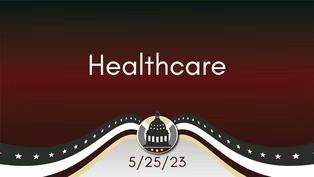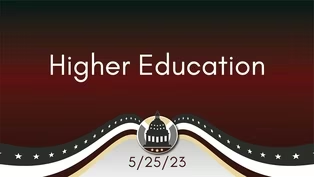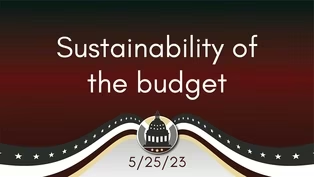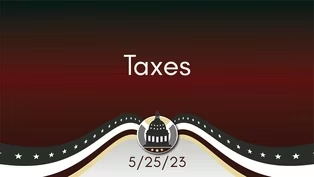Your Legislators
Bonding Bill 5/25/23
Clip: Season 43 Episode 12 | 8m 26sVideo has Closed Captions
Host Barry Anderson and guests discuss the bonding bill.
Host Barry Anderson and guests discuss the bonding bill. Guests this episode: Sen. Mary Kunesh (DFL), District 39, New Brighton, Assistant Majority Leader; Sen. Zach Duckworth (R), District 57, Lakeville, Assistant Minority Leader; Rep. Jamie Long (DFL), District 61B, Minneapolis, Majority Leader; and Rep. Spencer Igo (R), District 07A, Wabana Township, Assistant Minority Leader
Problems playing video? | Closed Captioning Feedback
Problems playing video? | Closed Captioning Feedback
Your Legislators is a local public television program presented by Pioneer PBS
This program is produced by Pioneer PBS and made possible by Minnesota Corn, Minnesota Farmers Union and viewers like you.
Your Legislators
Bonding Bill 5/25/23
Clip: Season 43 Episode 12 | 8m 26sVideo has Closed Captions
Host Barry Anderson and guests discuss the bonding bill. Guests this episode: Sen. Mary Kunesh (DFL), District 39, New Brighton, Assistant Majority Leader; Sen. Zach Duckworth (R), District 57, Lakeville, Assistant Minority Leader; Rep. Jamie Long (DFL), District 61B, Minneapolis, Majority Leader; and Rep. Spencer Igo (R), District 07A, Wabana Township, Assistant Minority Leader
Problems playing video? | Closed Captioning Feedback
How to Watch Your Legislators
Your Legislators is available to stream on pbs.org and the free PBS App, available on iPhone, Apple TV, Android TV, Android smartphones, Amazon Fire TV, Amazon Fire Tablet, Roku, Samsung Smart TV, and Vizio.
Providing Support for PBS.org
Learn Moreabout PBS online sponsorshipBut I wanna move to a topic that we get a lot of questions from our viewers about and that of course is the bonding bill.
And this was an area of agreement, didn't start out that way, but kind of wound up that way.
And let's start with you Senator Duckworth.
Maybe you could give our viewers a little bit of a roadmap as to how we got there because of course in order to get a bonding bill passed you have to have both majority and minority support and maybe give our, give a picture of how that transpired to our viewers.
Start with you Senator Duckworth and then we'll go to Representative Long.
- Sure.
Appreciate the question.
And just to give a little bit more context, when you say that you need both majority minority support, it's a math question.
You need more than just a simple majority of votes.
You need a few from the minority as well, a total of seven.
And that's why that bill sometimes is a little bit more involved in negotiations than others.
And so at the beginning of the session there was work to done to try to build consensus regarding a bonding bill, building off one that was in talks from the previous session.
And Senate Republicans, and Republicans in general, in the House as well were frustrated with the lack of tax relief or the lack of surplus that was being proposed to be refunded to people.
And so we kind of were very upfront with folks from the very beginning of sessions saying, hey, unless there's meaningful tax relief in here, unless we're gonna eliminate completely the tax on social security and give folks back meaningful checks like was promised not that long ago, checks of 1,000 to $2,000 that we just don't feel comfortable borrowing more money, how are we as a stake gonna borrow more money while folks are out there struggling to meet their needs for these projects?
So long and short of it is it took a few months as the clock was running low toward the end of session, we had to pivot a little bit when it became clear that there just was not support from Democrats for substantial tax relief or substantial refunds for checks.
And also pressing were our nursing homes and taking care of our seniors and elderly.
So part of negotiations to still move a bonding bow forward which would get to many critical as projects across the state, we said, hey, work with us on providing the funding that's missing currently in the human services bill for nursing homes so we can take care of grandma, grandpa, mom and dad and if you can work with us on that, if you can prioritize our seniors, then we can get some support for this bonding bill to help get these products completed across the state.
So that's long and short of how it played out.
- Representative Long, your thoughts on the bonding bill?
- Well I'm really glad that we came to an agreement.
It was the largest bonding bill on state history and so that's going to mean great projects across the state and a lot of job creation for our folks who build these projects.
It did take us a while to get there.
We didn't have a bonding bill for three years and when we were in divided government the last two years, we weren't able to reach agreement.
So it took a unified government to be able to get to this point that we have a bonding bill.
The House passed our bonding bill several months ago on a bipartisan basis.
And so we were waiting on the Senate and I'm really glad they came along and we were able to get a deal done to get this important workout, we'd prepared an all cash bill and we were ready to do that.
But I'm glad that we were able to come into agreement because it's a lot better to bond for these projects and pay for them over time and it means we can do more work.
My colleagues on the call have mentioned the spending that we're doing this year.
Well this is part of that spending and this is spending they support to get out the bonding investments across the state.
40% statistic that they both used is talking about the two year budget that we have right now and not the on ongoing budget because we have this one-time surplus where we have the advantage of being able to use that money for some of these infrastructure investments.
This is the perfect place to use one-time money is for some of these bonding projects and infrastructure investments because that doesn't create an ongoing challenge for our budget into the future.
And so I think this was a great area for us to find agreement and I'm glad we got there.
- Representative Igo, your thoughts on the the bonding bill?
- Yeah, well, you know, it definitely was a rollercoaster if you will, right.
with the house passing our bonding bill back in March and kind of working through the process, it was very important that, you know, the Senate Republicans and the house residents worked together to make sure that we got that nursing home funding in at the end 'cause it was critically important.
If we're gonna pass a bonding bill, which in Northern Minnesota it's called the jobs bill, if we're gonna pass something like that, we need to also take care of our seniors.
So it's good to see that happen.
And again, there's a lot of good infrastructure in the first geo bonding bill, you know, the cash bill that was brought to the House floor here yesterday and passed for the Senate.
That definitely changed a lot.
We saw new spending going to a lot of nonprofits, which was something unique that I don't know if I was fully in support of when I was going through the list.
I mean it was very last minute, but there was a lot of things in there that had to happen.
There was people in communities in the state having to drink bottled water for the last two years 'cause we needed to get a bonding bill done.
I got a community in my district that we have a project that a rising pit lake of water was ready to break and destroy three cities in northern Minnesota if we didn't get this bonding bill passed.
So those are some of the things that we are really addressing is really getting at the core of helping people providing jobs and building out infrastructure, which is our duty by constitution.
But it is important to make sure those projects are vetted properly and sent to the right places so they can do the most good, provide the most jobs and give Minnesotans the highest quality of life.
- Senator Kunesh, bonding bill?
- Well I was really glad and so relieved that we finally came to an agreement and were able to access those one time dollars and the other numbers that were available to us to make sure that those dollars are going to go into the communities that need the most.
It's, you know, I think, it's been since 2020 that we've had a bonding bill and so there are a lot of communities that were in a, you know, a bit of a hurt.
We talked a little bit, it was mentioned about the water and wastewater projects.
I mean that's huge.
I think that there's close to 50 projects in this bonding bill across the state to address that issue.
But I think it's also, and I mentioned transportation earlier, so that's going to be another good one.
But there's also dollars in there for our natural resources and every spring we hear about flooding across our states.
So the fact that there's quite a bit of money in there for some flood mitigation is going to be really important to those communities.
We've talked about our youngest, we've talked about our oldest, but there's also important dollars in there for our veterans, which I am glad to see, especially making sure that that there are upgrades to the shelters or to the homes that veterans are living in and being able to expand it.
But I think that if you look through the list of the cash projects and you look at where all those dollars are going to, I think it's really so important that we are also supporting the community organizations that provide those boots on the ground services to our communities.
There's lots of homeless shelters in that bonding bill.
There are educational, all sorts of things in there.
So I know that Senator Pappas and Representative Lee worked really hard to ensure that there was a good balance across Minnesota to address the really unique and specific needs of the communities.
A lot of dollars going directly to the city, to public safety.
And so I would give it an all around A+ on a bonding bill because this has been a long time coming and our communities really need it and I'm sure they're going to appreciate it.
Video has Closed Captions
Clip: S43 Ep12 | 7m 26s | Host Barry Anderson and guests discuss healthcare. (7m 26s)
Video has Closed Captions
Clip: S43 Ep12 | 9m 40s | Host Barry Anderson and guests discuss higher education. (9m 40s)
Sustainability of budget 5/25/23
Video has Closed Captions
Clip: S43 Ep12 | 9m 25s | Host Barry Anderson and guests discuss the sustainability of the budget. (9m 25s)
Video has Closed Captions
Clip: S43 Ep12 | 8m 4s | Host Barry Anderson and guests discuss taxes. (8m 4s)
Providing Support for PBS.org
Learn Moreabout PBS online sponsorship
- News and Public Affairs

Top journalists deliver compelling original analysis of the hour's headlines.

- News and Public Affairs

FRONTLINE is investigative journalism that questions, explains and changes our world.












Support for PBS provided by:
Your Legislators is a local public television program presented by Pioneer PBS
This program is produced by Pioneer PBS and made possible by Minnesota Corn, Minnesota Farmers Union and viewers like you.





